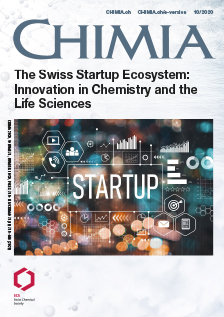AquaSpark™ – Rapid Environmental Monitoring of Listeria monocytogenes
DOI:
https://doi.org/10.2533/chimia.2020.791PMID:
33115562Keywords:
Bacteriophages, Chemiluminescence, Environmental monitoring, Food safety, ListeriaAbstract
In order to prevent microbial contamination of food, monitoring of the production environment, together with the rapid detection of foodborne pathogens have proven to be of utmost importance for Food Safety. Environmental monitoring should detect harmful pathogens at the earliest point in time in order for the necessary interventions to be taken. However, current detection methods fall short with regards to speed, ease of use, and cost. This article aims to present the idea behind NEMIS Technologies, a startup company making use of the novel AquaSpark™ technology for the development of a new generation of bacterial detection methods. These methods utilize chemiluminescence in order to detect live target bacteria in a short period of time compared to that of conventional methods. We show that dry-stressed Listeria monocytogenes can be detected within 24 hours, using small-molecule chemiluminescent probes, together with a bacteria-specific proprietary enrichment broth containing a cocktail of bacteriophages, which enhance the specificity and sensitivity. This novel platform technology has the potential to extend beyond environmental monitoring towards food analyses as well as veterinary and human health.
Downloads
Published
Issue
Section
License
Copyright (c) 2020 Giverny M. Ganz, Lukas Reinau, Anne-Flore Imhaus, Mario Hupfeld, Lars Fieseler

This work is licensed under a Creative Commons Attribution-NonCommercial 4.0 International License.







